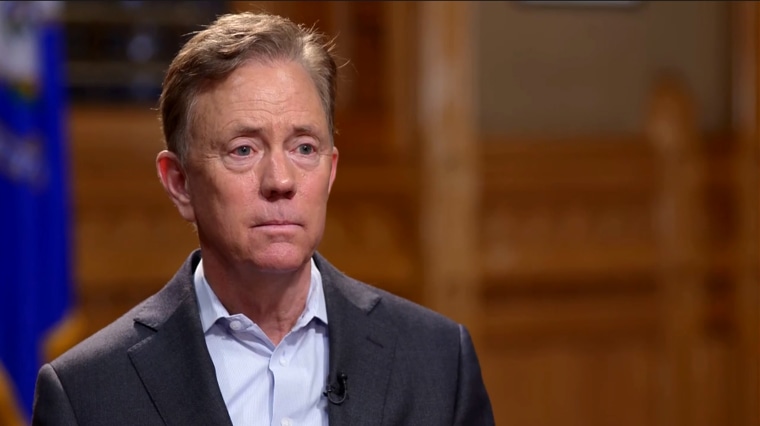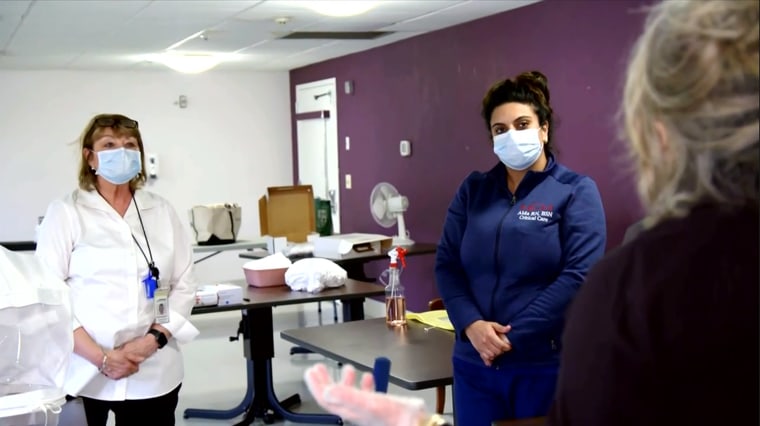MERIDEN, Conn. — The single-story red brick building looks unremarkable on the outside. But this nursing home in central Connecticut is now the site of a novel approach to protect the population most vulnerable to the coronavirus.
Connecticut is among a handful of states to open COVID-19-only facilities that provide an environment specially designed to handle infected patients — and help prevent outbreaks at other nursing homes.
"This is really the safest approach," said David Grabowski, a professor of health care policy at Harvard Medical School.
The deadly virus has wreaked havoc across the country, killing more than 80,000 people. No institutions have been hit harder than nursing homes, where outbreaks are particularly dangerous for the highly concentrated populations of the ailing and the elderly.
Full coverage of the coronavirus outbreak
It is estimated that a third of nursing homes nationwide have at least one COVID-19 case, according to Grabowski, in part, he said, because "nursing homes have been in the back of the line in terms of getting testing and personal protective equipment."
In Connecticut, more than 50 percent of the state's known COVID-19 deaths are linked to nursing homes, according to the latest figures, a total of 1,627 long-term care patients.
Of the 213 registered nursing homes in Connecticut, at least 159 have had positive cases and 146 have had deaths as of May 6, according to state health department data. Three facilities have had more than 100 residents test positive.
The figures are expected to rise dramatically in the next week as testing is expanded across the state.
"I'm terrified," Connecticut Gov. Ned Lamont said.
"Nursing homes are like a petri dish for this pandemic," added Lamont, who pushed the plan for facilities restricted to coronavirus patients only.

The new centers are intended to be the first stop for nursing home residents who are released from the hospital after having been treated for COVID-19. The facilities can also provide a critical service to seniors who are hospitalized with the virus and need rehab after their stints or for COVID-19 patients in nursing homes that are unable to safely segregate infected residents.
In all of the cases, keeping the patients in a COVID-19-only facility ensures that they will get specialized care and avoid potentially exposing seniors at other nursing homes.
The state has five free-standing centers, including the single-story facility in Meriden called Westfield Specialty Care Center.
NBC News was granted an exclusive tour of the 90-bed facility, owned and operated by Athena Health Care Systems, before it accepted its first residents on May 1. The building was previously used as a nursing home, but it shut down in November.
That makes it an ideal candidate to be used for COVID-19 patients only, according to experts like Grabowski.
"You're not displacing existing residents by moving nursing home residents out of a building to create a COVID-specialized facility," Grabowski said.
"You have adequate infection control and personal protective equipment. This is really what we want to see in terms of a specialized COVID facility, and this is really what many clinical leaders and what many nursing home leaders around the country are calling for."
Meriden Mayor Kevin Scarpati acknowledged that some people living in the community were concerned about opening a facility catering to people suffering from the virus.
"But one thing that I think we've embraced is the fact that there is a need," Scarpati said. "There's a need for these individuals who are needing to transition out of a dangerous environment in a hospital before they go back and potentially cause infection for other residents in their nursing homes."
Upon entering the center, staffers are screened for symptoms and their temperatures are taken. Staffers said in interviews that they have no fears working at a facility replete with COVID-19 patients in large part because they have proper personal protective equipment, or PPE, and training.
"I'm in that critical age group, and I'm not concerned," said the facility's head administrator, Donna Orefice. "We have the proper PPE. We have proper infection control procedures. We're keeping our staff to individual units so that people aren't crossing."
Orefice said she didn't need to spend time convincing her family that she should accept the job. "They know what kind of person I am," she said.

Dr. Anu Walaliyadda, the facility's medical director, said providing a place for the elderly to go when they leave the hospital will also help alleviate the burden on area medical centers. He said recovering coronavirus patients of any age would be welcomed in Meriden.
"It's whoever that is needed," Walaliyadda said, noting that younger COVID-19 patients sometimes need additional rehab after they leave the hospital. "They can come to a place like this and recover."
Creating COVID-19-only facilities presents numerous challenges. Chief among them: Where do you find the space?
Unable to find other empty facilities like the facility in Meriden that could quickly be repurposed, Connecticut officials decided to move healthy residents out of two existing homes to turn them into coronavirus-only centers.
State health officials have said they agonized over the decision, knowing that moving nursing home residents can lead to poor outcomes.
"It's really traumatic to move long-stay residents," Grabowski said. "That's a policy that's really not putting the nursing home residents first."
That the nursing home system across the country is under unprecedented strain should come as little surprise, Grabowski said.
"Nursing homes have always been this forgotten setting," he said. "They've been underfunded. Oftentimes we have a workforce that is underpaid and underappreciated. Nursing homes are forgotten in many respects."
So when the coronavirus struck, it hit many facilities filled with vulnerable elderly particularly hard.
The crisis isn't just among the residents — staff members are struggling, too. About 40 percent of the workers in 13 nursing home facilities in Connecticut are out sick with COVID-19 or are quarantining at home, according to Rob Baril, president of the SEIU Healthcare 1199 union. And that often means fewer staff members are available to take care of sicker residents.
Baril said he doesn't believe that a small number of COVID-19-only facilities are going to make a significant impact on slowing the death toll. "The overwhelming majority of the cases of nursing home residents who are ill are outside of the state's" COVID-19-only facilities, he said.
Grabowski believes it is a good first step, especially when combined with other moves the state is taking.
"Connecticut deserves a lot of credit, he said. "They're testing everyone — staff and residents — they're providing personal protective equipment for the staff and then finally creating these specialized COVID facilities."
Download the NBC News app for full coverage and alerts about the coronavirus outbreak
The federal agency that oversees nursing homes isn't keeping track of coronavirus-only facilities.
The nursing home crisis has plagued governors around the country.
In New York, the hardest-hit state, Gov. Andrew Cuomo has drawn criticism for his response to outbreaks in nursing homes, including a mandate that required the facilities to take back coronavirus patients being discharged from hospitals.
"If you can't provide adequate care to a patient, you must transfer the patient," Cuomo said last month. "If they cannot transfer a patient to another facility, they should call the Department of Health ... and the Department of Health finds a facility."
The governor said repeatedly that if nursing home operators couldn't find appropriate transfers, the state would.
Cuomo has also faced scrutiny for saying it's "not our responsibility" to provide protective equipment like masks and gowns to privately owned nursing homes, although the state has now done so.
On Sunday, Cuomo announced a policy shift aimed at providing new measures to protect the 100,000 New Yorkers living in nursing homes. Under the new policy, hospitals aren't allowed to release COVID-19 patients to nursing homes. They now must hold on to the patients or send them to one of the state's COVID-19-only facilities. Cuomo also says he is mandating that all nursing home staffers be tested twice a week.
Lamont, the Connecticut governor, said his office has devoted considerable time and effort to securing protective equipment and testing supplies for his state's nursing homes.
"I've gone to every single broker from China I can find," Lamont said. "I've gone down on bended knee to the Mike Pence commission and said, 'This is what you need to do.' And most importantly, I've worked with all the private vendors I could, the major businesses that are responsible for this, and that's how we're getting significant loads of PPE and testing we wouldn't otherwise get."
"I think, especially in a crisis, the buck stops right here," Lamont added.

